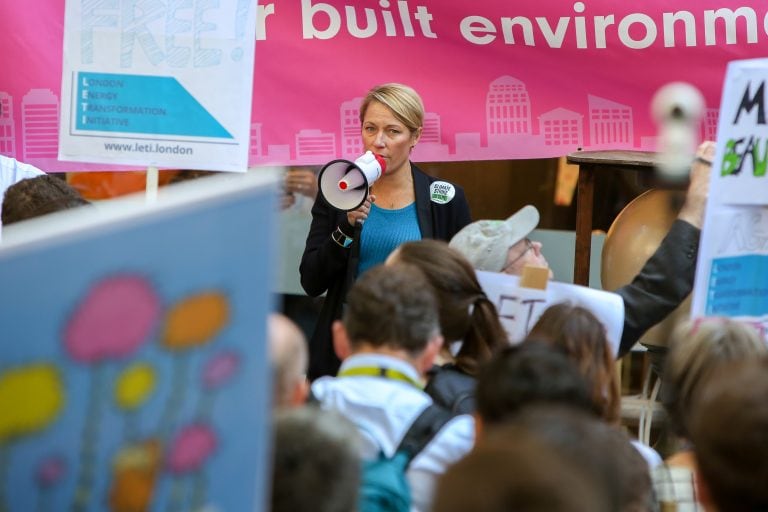Climate activism will change business as usual

For over a year, children around the world have been demanding stronger and swifter action on the climate crisis, but now it seems the ‘Thunberg-effect’ has galvanised the wider population.
Last month, unprecedented numbers of adults, myself included, joined the Global Climate Strike demonstrations in a city near them. This sent a strong message, a cry for action, to global leaders who met in New York for the UN Climate Summit the following week. Now we’re seeing more extreme activism as Extinction Rebellion commence their autumn uprising in cities across the globe – with even Boris Johnson’s father addressing protesters in London.
Time to act
There is a history of youth culture driving change, from the Vietnam war protests to Malala Yousafzai taking a stand for girls’ education. The climate strikes are no different, acting as a catalyst, empowering adults who share the concerns of school children. This time businesses have taken a stand, with many allowing their staff to join the strikes, and leveraging the moment to launch their own climate commitments.
The Global Climate Strike was more than an event, it represented a hunger for change, a new zeitgeist which is gaining considerable momentum. While there is a moral imperative for businesses to reduce their environmental impact, there is now such a groundswell of public opinion businesses ignore it at their peril. Now is the time for strong environmental leadership, and businesses of all sectors must act fast to keep up with the changing views of their staff.
For property and construction, traditionally risk averse and cost-conscious sectors, it is high time to get on board, modernise and change mindsets, to stay relevant to the public’s concerns. 40% of the UK’s total carbon emissions are attributable to the built environment. So, tackling the carbon footprint of buildings is a major priority.
Modernise or die
If the UK Government’s target of net zero carbon emissions by 2050 is to be reached, tougher regulations will no doubt be introduced. But this is no longer the main driver – our sector must anticipate and respond to the changing needs and expectations of the youth of today as the building occupants of tomorrow. By 2020, millennials will already make up 50% of the workforce, bringing with them a new set of attitudes towards work-life balance, where they work, and who they work for.
Indeed, personal values now drive wide-ranging consumer choices. Research by Waitrose shows that a third of Britons now either eat no meat or have reduced their meat consumption, with environmental concerns an important driver. Conversely, consumer appetite has led to a 12.8% increase in the global wellness industry in the last two years.
In the workplace, the connection between health, wellbeing, productivity and environmental credentials is now well-established. Natural light, air quality and greenery all play an important part in improving the work environment. Businesses are seriously investing in this, as studies, for example, by engineering consultancy Ramboll reveal they will find it easier to attract and retain talent in a sustainable workspace.
We know that younger workers are influencing the traditional workplace. Break-out areas, collaboration spaces and more amenities are increasingly common to serve those millennials who don’t want to sit at a desk all day. But it goes far deeper than this. Recent US-based research found that more than 70% of millennials said they were likely to choose a job with a company with a strong environmental agenda compared to less than 25% of Generation X.
There’s no doubt that sustainability is now part of a successful brand’s DNA. Research by PWC indicates that 58% of millennials would avoid working in a particular business sector if it had a negative image – fossil fuels and banking already appearing at the bottom of the rankings. This has major implications for the built environment, as a provider of space for businesses as well as a sector with a desperate need to attract and retain talent.
From commitment to action
Now, more than ever, it is vital for the sector to embrace sustainability and transparency, which is why the UK Green Building Council has launched its climate commitment platform ukgbcclimate.net. It is a means for property businesses to set out and review their sustainability goals and targets. It allows the sector to be transparent and accountable to its targets and we hope it will stimulate stronger carbon commitments and encourage best practice.
So @UKGBC we believe in #transparency and #accountability which is why our new Climate Commitment Platform & Leadership Model are so important… tell us what you think! #WGBW2019 #BuildingLife https://t.co/9tv3bcC0iw pic.twitter.com/fCDHzayPgX
— Julie Hirigoyen (@JHirigoyen) September 24, 2019
This isn’t about a box-checking exercise; genuine action takes strong leadership. There was a time when businesses could say ‘none of this is my responsibility’ or that ‘these issues are outside of our control’. Not any more. Property businesses need to be advocates for change, raising awareness and educating their staff, tenants, customers and suppliers. Of course government leadership is also needed in the form of clear long-term policy frameworks and incentive packages. So businesses need to engage with policy-makers, encouraging them to put in place policies that are fit for purpose.
We know that climate change will continue to rise up the agenda. We know that we are now facing an existential crisis. We only have to listen to the science… and the voices of our children.
Visit the UKGBC Climate Commitment platform here. Want to see your organisation on the platform? UKGBC members can email anz@ukgbc.org to request a listing.
Next week, UKGBC is partnering with MIPIM UK to help put the climate crisis front and centre of industry debate. Julie Hirigoyen will be chairing a session ‘Investment insights from leading responsible investment family offices’ and members of UKGBC’s senior team will be at the conference to encourage industry leaders to take action. Find out more here.
Related
Navigating the challenges around hard-to-recycle materials

What are the environmental impacts of construction materials? An introduction to Embodied Ecological Impacts

Why is social value so crucial when developing and managing commercial real estate?

Biodiversity Net Gain: Are you ready for the incoming legislation?

